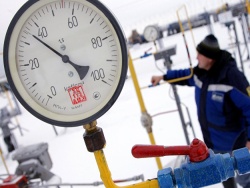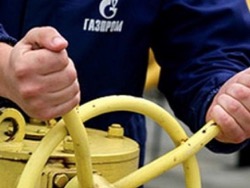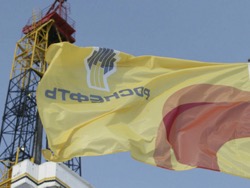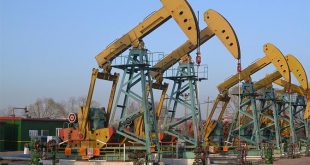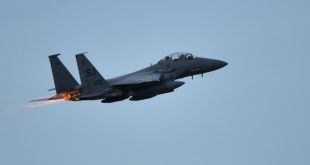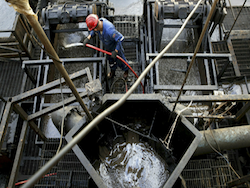
The leaders of the Russian oil industry since the beginning of the fall in oil prices have lost 20 to 40% of its capitalization. Only “Rosneft”, “LUKOIL” and “Gazprom” in aggregate, dropped $67,8 billion (and around $40 billion were allocated for Gazprom). However, due to the growth of the dollar in roubles capitalisation of companies increased by 36-38%, except for “Gazprom”.
The fall in oil prices has affected the quotations of the largest Russian energy companies, reducing their capitalization. Prices began to decline from mid-July 2014, when a barrel of North sea Brent crude, the price of which is linked to the price Russian Urals cost $110. Tuesday on the London stock exchange, may futures for Brent traded around $41,6. The fall in prices was primarily caused by the oversaturation of the global market, which, in turn, was associated with the growth of shale production in the U.S. increasing oil production in Saudi Arabia and a slowdown in China, one of the largest consumers of oil.
Shares of Russia’s largest oil company Rosneft on July 18 2014 traded in London at $6,36 per share. On Tuesday the price was $4,67, i.e. the decline was 26,57%. Similarly, decreased and the capitalization of the company from $67,4 billion Rosneft “lost” up to $49,49 billion.
However, this is in dollars. And the dollar since that time has grown significantly. If on July 18, 2014, one dollar was worth 34.8 ruble (the exchange rate of the CBR), the rate of the Central Bank on Wednesday — 67,78 ruble. Thus, the rouble has fallen in price to dollar almost doubled, and this has affected the value of shares and capitalization of Russian oil companies in rubles.
Papers “Rosneft” on the Moscow stock exchange with 18.07.2014 went up by 36.4%, with 231,75 ruble to 316,15 rubles apiece. Capitalization increased from 2,456 trillion to 3.35 trillion rubles.
Similar situation with the largest independent oil company in Russia LUKOIL, although it fell somewhat less. The value of the securities of the company in London from mid-July 2014 declined by 22.3%, to $40,54. Capitalization — from $44,38 billion to $34.5 billion On the Moscow stock exchange “LUKOIL” since the beginning of the falling oil prices rose by 646 billion (38,17%), up to 2,338 trillion. The quotes increased in price since 1990 rubles to 2749 RUB.
Although Russian gas monopoly Gazprom and not directly dependent on oil prices, however, they still affect the position of the company as the price of long-term export contracts of Gazprom, which provide him with a basic income linked to the oil price with a lag of 6-9 months. In mid-July 2014, the shares of “Gazprom” on the London stock exchange worth us $7.7 per unit, Tuesday — $4,32 (-43,9%). Capitalization fell from $91 billion to $51.13 billion But on the Moscow stock exchange quotes “Gazprom” for the same period, in contrast to the oil companies, has not changed.
Shares rose less than 1%, is 147.5 148,4 ruble to ruble. Accordingly, virtually unchanged capitalization — now it is 3,513 trillion, whereas in mid-2014 was 3,491 trillion. Such a difference from oil players is primarily due to the fact that the domestic market, where most of the volumes of gas “Gazprom” the prices regulated by the government and can differ from export at times (depending on the region). Besides, “Gazprom” in recent years, more and more inferior to the domestic market to independent players like NOVATEK and “Rosneft”.
— Also could play a role is the disappointment of investors that Gazprom recently reduced the proportion of and foreign markets, — says the analyst of Bank “URALSIB” Alexey Kokin. — The situation began to change only now, in the first quarter of 2016.
According to analysts, this year “Rosneft” can catch up with Gazprom’s capitalization.
— The company “Rosneft” was fundamentally undervalued before the crisis, and today its market capitalization is, in fact, does not depend on real indicators, and the country factor and the politically motivated sanctions. However, the company has passed the test of crisis. By fundamental factors (production, cost, free cash flow, profits), “Rosneft” — one of the best in the industry. The level of tax burden on the company is not comparable to the performance of global majors, which are not under sanctions, — have informed in “Rosneft”.
However, according to Kokina, especially glad it is not necessary and the oil.
— Indeed, the weakening of the ruble masks the lower cost companies in dollars, — says the expert. But mineral companies primarily valued in the us currency, as it is estimated the raw materials.
However, a bonus Russian oil companies due to the fall of the ruble still get — because they are considered costs in rubles, and they can be reduced. Whereas, for example, American companies are deprived of such opportunities. Oil companies suffered from the fall in oil prices not only in Russia. Financial Times writes that the 300 largest global companies have lost since the summer of 2014 about 40% of its value, or about $2.3 trillion.
Now the leading countries oil production are planning to hold talks about the freezing of oil production at the January level. With increased demand, this should lead to the reduction of excess oil on the market (1.5 million barrels per day) and corresponding higher prices. A preliminary agreement on freezing was reached in mid-February, Russia, Saudi Arabia, Venezuela and Qatar, the next stage of negotiations to be held on 17 April in Qatar Doha. Previously OPEC and producers outside the organization, called the acceptable variety of prices, but mostly they were in the range of $50-70 per barrel (and closer to the bottom mark).

